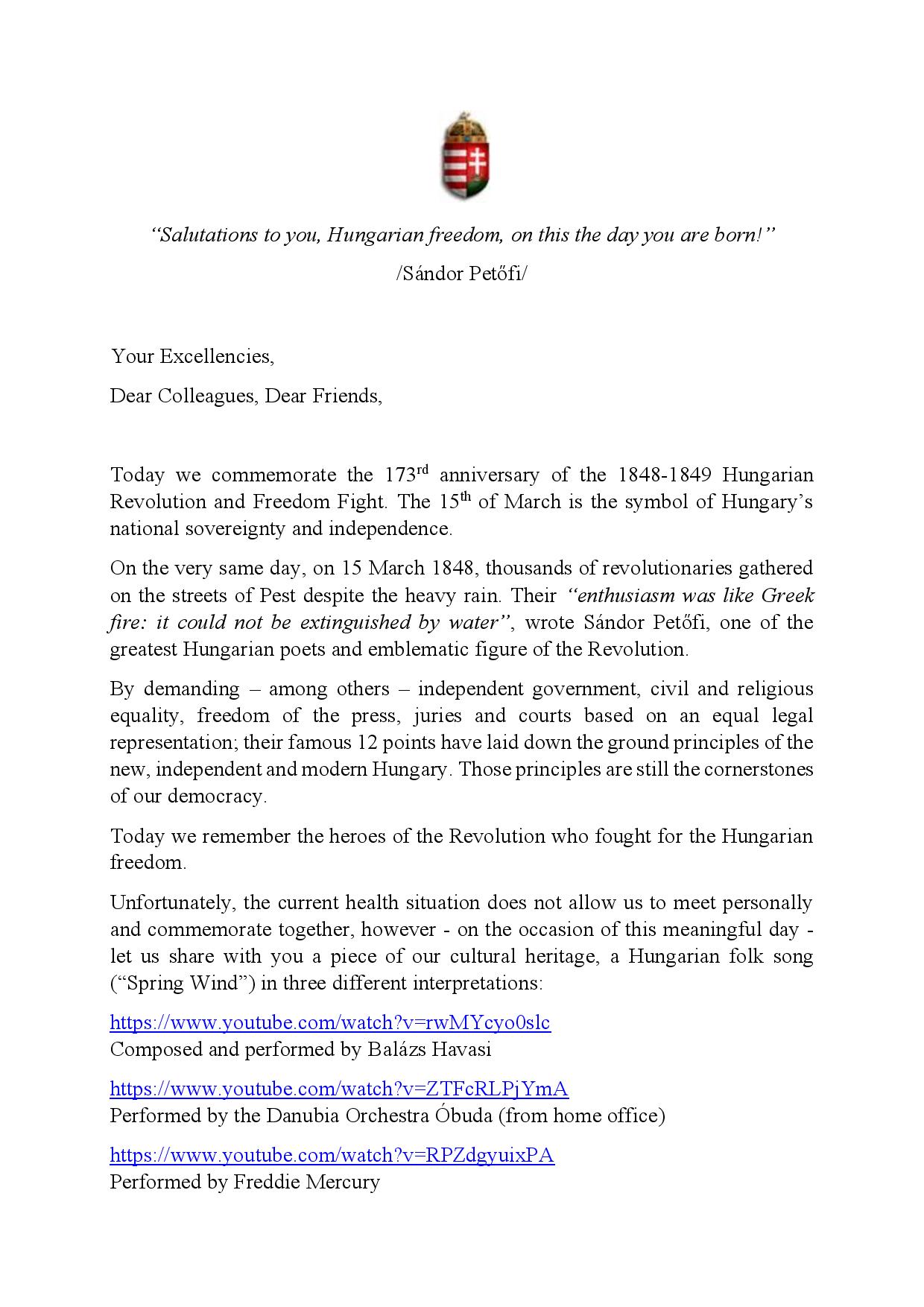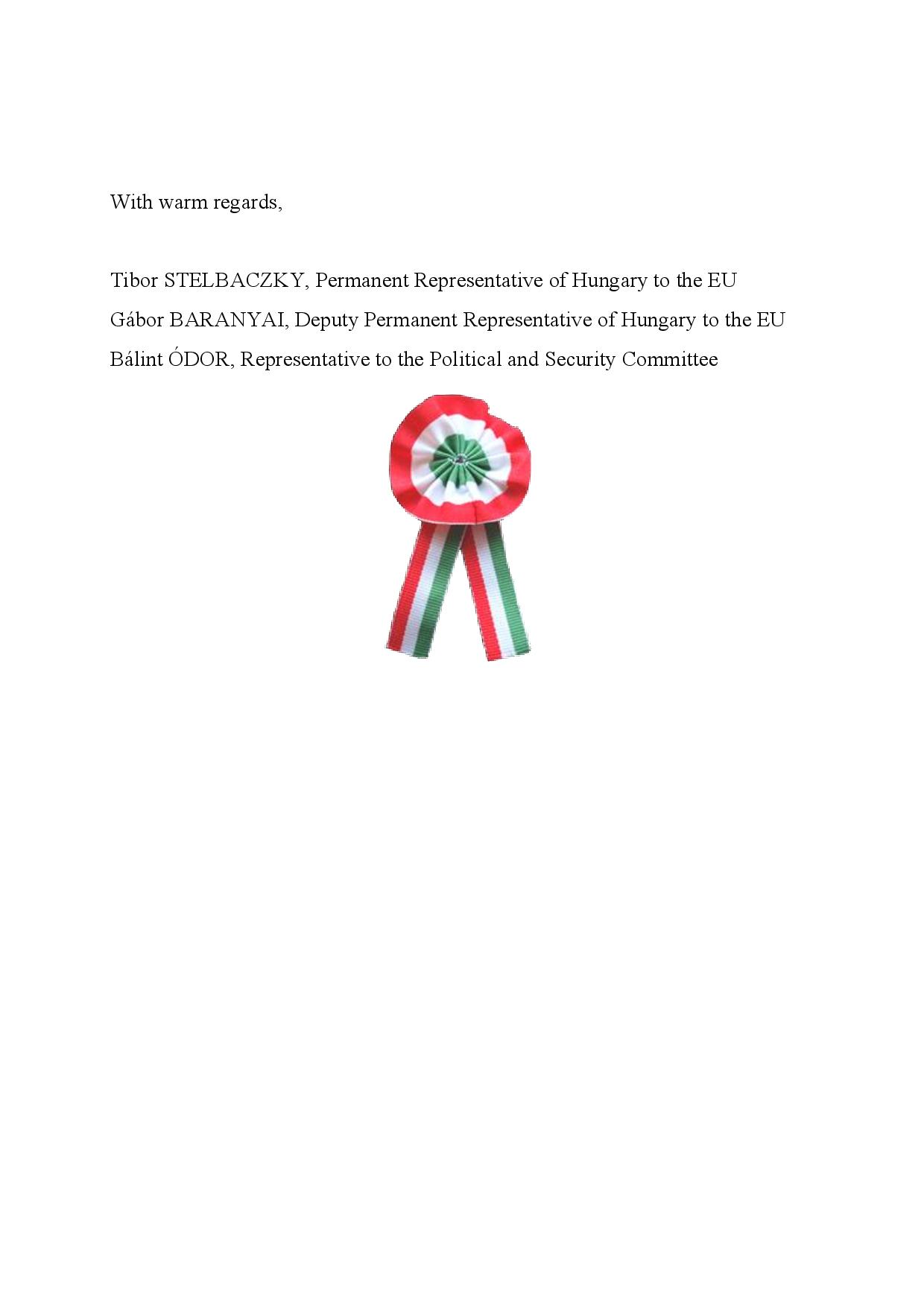Keresés: %s
Keresés: %s
In Hungary there are no problems with rule of law
On Monday, at the Alpbach international forum focusing primarily on issues related to the European Union, Justice Minister Judit Varga stood up for the state of the rule of law in Hungary.
The Minister attended a panel discussion about the future of European integration via an online link. She expressed hope that after the crisis caused by the coronavirus epidemic, the “quality” of cooperation among Member States in the EU will improve and the European integration will continue as a close cooperation of strong Member States, but without unnecessary ideological debates and the application of double standards.
She took the view that in the EU we need “intellectual sovereignty,” and said she was convinced that the crisis of trust that had developed before the pandemic and Brexit would also disperse. Hungary would like its national characteristics and identity to be respected as laid down in the Treaties of the EU.
The coronavirus epidemic, too, highlighted that the EU is a community of strong nations where in crisis situations the primary responsibility lies with national governments, Ms. Varga pointed out. She added that EU institutions were not sufficiently prepared for a quick response, but contributed effectively to improved coordination among Member States.
Regarding the economic recovery package and the long-term EU budget, Ms. Varga said upon accession to the EU, Central European countries proved to be good pupils, they met the necessary economic criteria. At the same time, in the context of post-crisis recovery, they demonstrated readiness to cooperate within the EU, and took part in the entire process in a constructive spirit, also taking into consideration the interests of large Member States.
The Hungarian government supports “smart integration” within the EU which improves the quality of cooperation among Member States and avoids unnecessary ideological debates, the Minister said.
Ms. Varga described the procedure instituted by the European Parliament against Hungary under Article Seven as politically motivated, and pointed out that in Hungary there is no problem of any kind with the enforcement of the rule of law.
She highlighted that it is primarily the liberal mainstream of the international media that claims that the conditions of the rule of law are not fully met in Hungary; however, these reports are misleading and contain no facts. Additionally, in the European Parliament the Hungarian answers and position were not even heard, she pointed out.
She also spoke about plans to tie EU grants to the fulfilment of fundamental principles related to the rule of law. She said the government’s main problem with this is that the definitions supplied so far are uncertain in a legal sense; for instance, they do not offer a precise explanation regarding what the violation of the rule of law means.
The discussion was also attended by Austrian Minister for the EU and the Constitution Karoline Edtstadler who urged ongoing talks and consultations among Member States in the interest of the improvement of EU cooperation.
Regarding issues related to the rule of law, she took the view that the conditions of a fair procedure must be afforded to every Member State. At the same time, she argued in favour of connecting together EU disbursements and the enforcement of fundamental democratic principles.
At the discussion, the United Kingdom’s departure from the European Union (Brexit) was also on the agenda. Ms. Varga described Brexit as an important lesson from which we must learn. She took the view that it also showed that there was a crisis of trust within the EU, and the solution is “smarter” integration, not “more” integration.
Ms. Edtstadler said the coronavirus epidemic came as a shock to the EU, several flaws of the integration came to the fore, and in the interest of remedying these flaws, it is necessary to make certain adjustments to cooperation within the EU. She said one of the most important aspirations is to take the EU closer to the people, and to take the people’s opinions into consideration more.
The Alpbach forum has been held annually since 1945, for the 75th time this year. Its goal is to discuss topical socio-political questions concerning the entire continent from angles involving science, politics, business and culture. The main topic of this year’s forum is the post-coronavirus epidemic situation.
At the panel discussion, Ms. Edtstadler mentioned that despite the epidemic, she has been in contact with the Hungarian minister throughout, they regularly consult by telephone. At the same time, Ms. Varga expressed hope that next year the organisers will be able to hold the Tyrol forum with personal attendance and that she will be able to attend.
(MTI/Cabinet Office of the Prime Minister)
We must maintain viability of Central Europe’s economy
Maintaining the viability of the entire Central European economy is in the best interests of the V4 countries; we must pursue an effective fight against the coronavirus epidemic, whilst “keeping our economies up and running,” Prime Minister Viktor Orbán said after the Friday meeting of the prime ministers of the Visegrád countries (V4: Czech Republic, Poland, Hungary, Slovakia) held in Lublin in South East Poland.
“It is not enough to put up an effective fight in respect of the number of incidences and fatalities, this is not enough; meanwhile, we must also maintain the viability of our countries and economies,” at a joint press conference Mr Orbán said regarding the strategy to be pursued in the second wave of the coronavirus epidemic.
He said everyone themselves must primarily find ways to maintain the functioning of the economy in their own countries, but after that it is well worth following this line also as regards economic cooperation in Central Europe.
The Prime Minister further highlighted that the V4 are seeking to set up a coordination system which would enable consultations within just an hour in the fight against the epidemic.
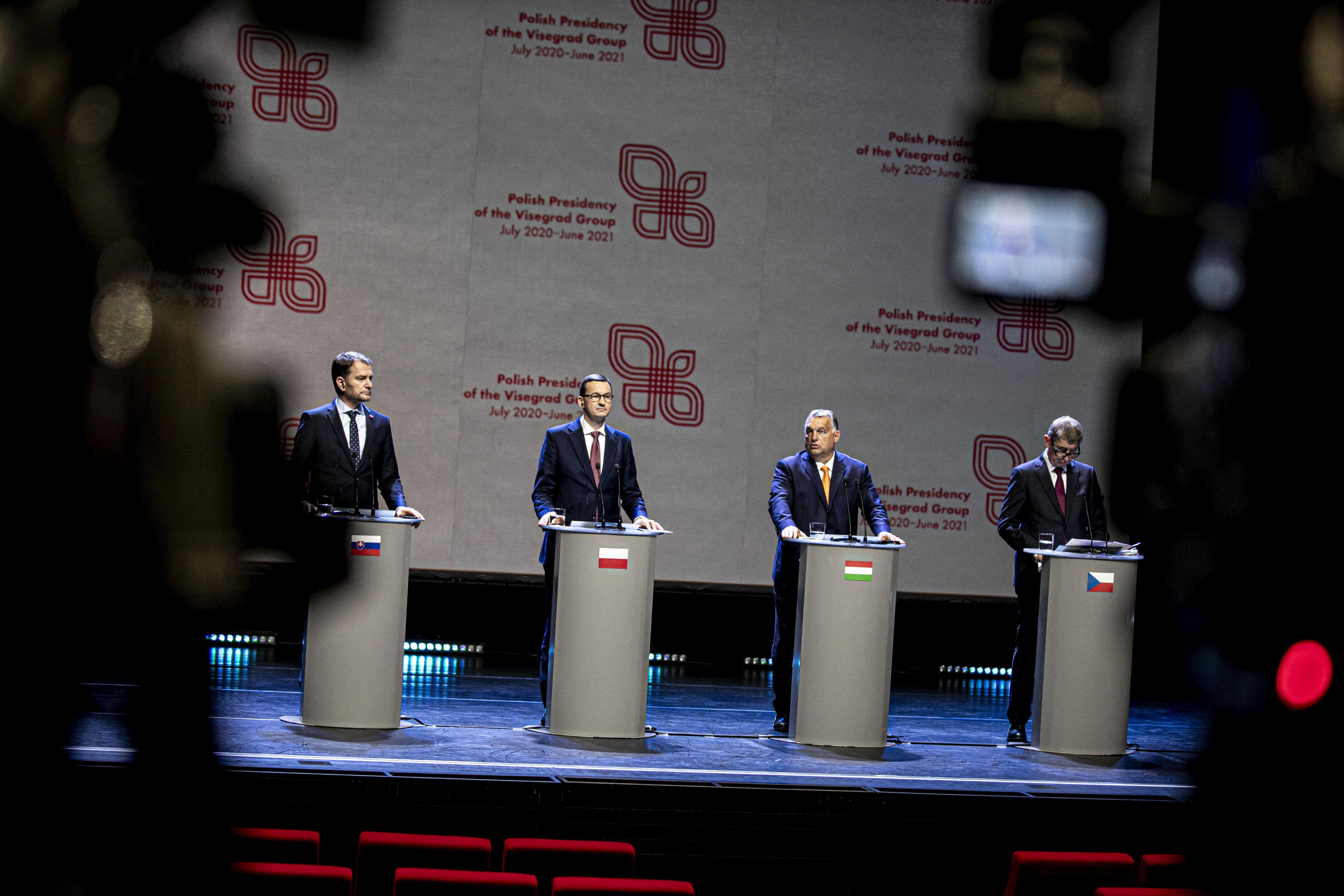
It seems that the second wave of the coronavirus epidemic is extremely aggressive, the number of incidences is rising world-wide, he indicated, adding that he is convinced that the speed of the reaction of governments will be crucial in the coming months.
Mr Orbán also said he would like for the enthusiasm of the V4 not to disappear despite the pandemic. “We must continue to make the most of the potential for growth that is inherent in our economies” so that the region may become Europe’s most liveable region, and so that the disadvantage that has accumulated due to communism should finally disappear, he underlined, stating that “we don’t want to give up this goal even amidst the epidemic”.
Regarding the situation in Belarus – which was also a topic of the meeting in Lublin – the Prime Minister said Hungary supports the Polish efforts, and welcomes the Polish plan that proposes to Belarus the economic pillar of a strategic cooperation scheme. “Democracy is important, so are human rights, but demanding these is not enough. We need more, we need a strategic approach, and today this is just what the Polish proposal seeks to achieve,” he said. He added that, in his view, within a few weeks, after the economy, they could also outline the military and security leg of an overarching strategic proposal. However, this will require a meeting of the European Council because it extends beyond the scope of the V4.
(Cabinet Office of the Prime Minister/MTI)
The brown trout called “Szilvásváradi pisztráng”, has became the newest Hungarian Protected Geographical Indication
The European Commission has registered a Hungarian freshwater fish in the list of EU protected geographical indications for the first time. The certification document was handed over to István Nagy Minister of Agriculture by Commissioner Janusz Wojciechowski on the margins of the Agriculture and Fisheries Council in Brussels, on the 21st of September.
The number of Hungarian agricultural products with a protected geographical indication - including food, wines and spirit drinks - rose to 61 after the registration of Szilvásváradi pisztráng.
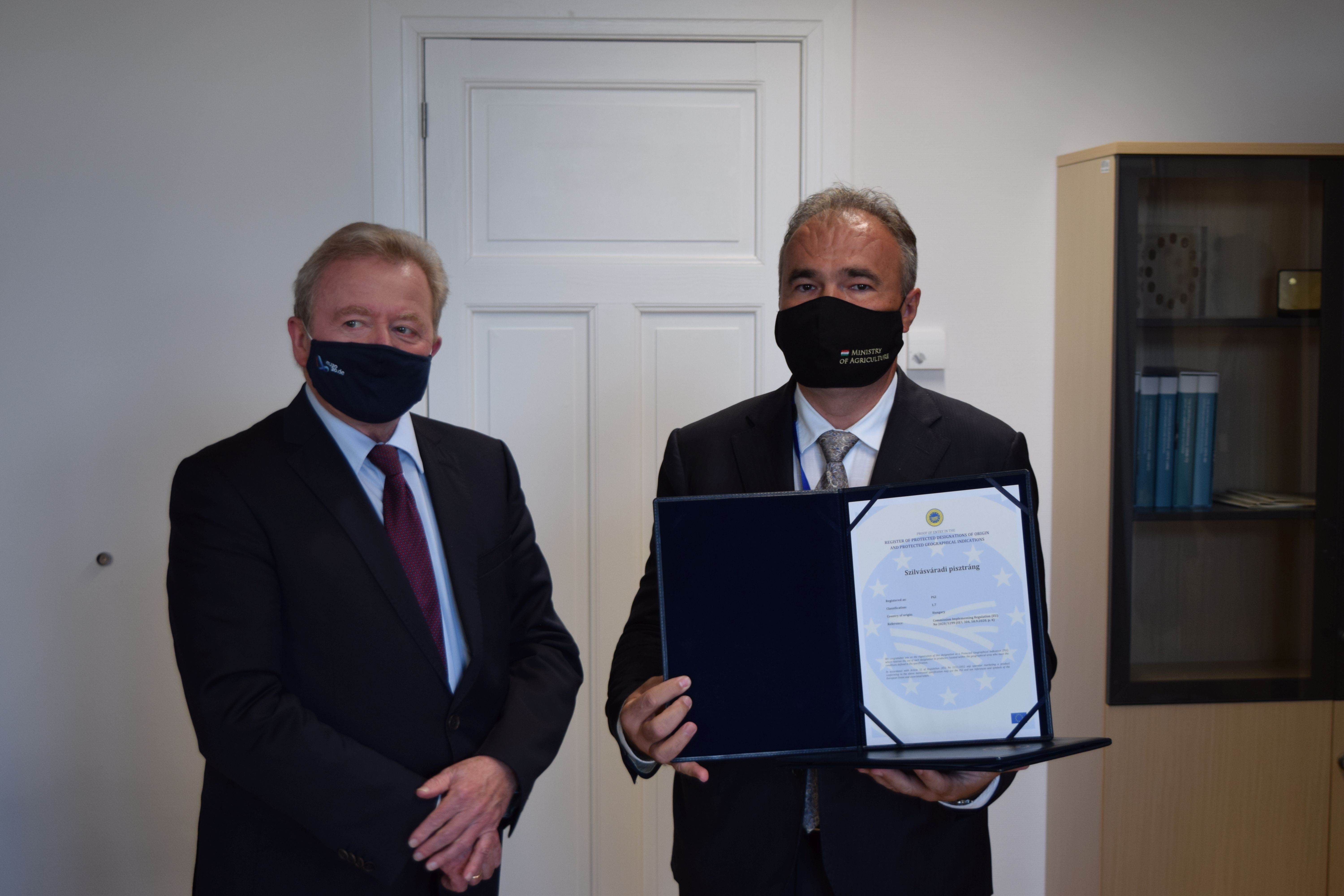
“I am proud of the fact that the number of Hungarian products under protected geographical indication is constantly growing. These top quality products are excellent reputation for our country in the EU and in third countries as well. I think it is a great appreciation of the Hungarian aquaculture sector as a whole, that Szilvásváradi pisztráng – as the first Hungarian freshwater fish - was included in the list of protected geographical indications. I hope this number will further grow in the near future with new Hungarian products,” said the Agriculture Minister.
Agriculture and Fisheries Council, 21 september 2020, Brussels
The German Presidency is committed to reach a general approach on the CAP reform package on the next AGRIFISH Council in October. In order to succeed, the main open issues were discussed, namely the CAP green architecture, the direct payments and the New Delivery Model.
Commissioner Wojciechowski recalled, that it is a common interest to have an effective CAP which ensures food security, but at the same time complies the ambitious environmental and climate goals too.
The French delegation presented a common declaration, supported by 15 Member States, on the need to develop plant proteins in European agriculture.
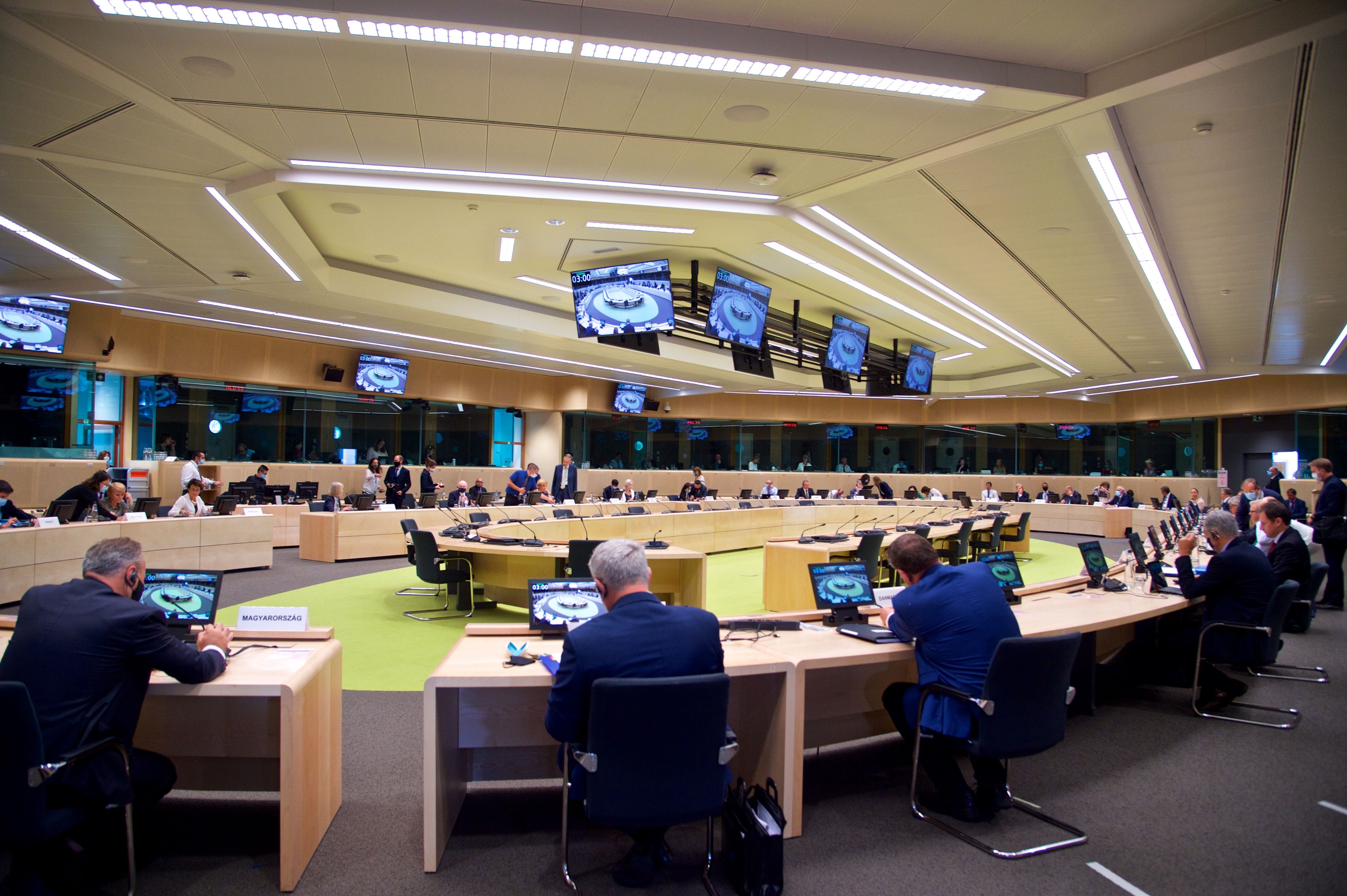
Spain highlighted the importance to maintain the current level of budget for the outermost regions (POSEI) during the 2021-2027 period.
On the second part of the Council, others topics were discussed as front-of-pack nutrition labelling, ban on hen cages, the recent outbreak of African Swine Fever in Germany and the situation in the pigmeat sector.
Ministers held an exchange of views on the agriculture related trade issues. The highlighted topics were the following: EU-China agreement on geographical indication (GI), the current status of the EU-Mercosur, EU-Mexico, EU-New-Zeland agreements and the Brexit negotiations, which were considered as top priority for EU agri-food trade in the near future.
Council agrees on the Horizon Europe’s budget- Marie Sklodowska Curie Actions get more funding
On 29 September the Competitiveness Council reached an agreement (in a general approach) on the Horizon Europe legislative package.
Member States evenly reduced the budget of the different parts of Horizon Europe. At the same time, they preserved the budget allocated for actions that support the less R&I intensive States. As an exception to the cut, Member States –along with Hungary- decided to allocate 200 million EUR from the European Innovation Council (EIC) to support the Marie Sklodowska Curie actions. The general approach paves the way to the last rounds of negotiations with the European Parliament and makes possible to finish the negotiations on Horizon Europe by the end of this year. Like this, calls for proposals could start without delay in 2021.
Environment ministers reached a political agreement on EU climate law and agreed to halt biodiversity degradation
Ministers held a debate on the draft European Climate Law and reached an agreement on it (partial general approach). The aim of the EU Climate Law is to set the EU’s climate neutrality goal for 2050. The 2030 climate goal is not part of the political agreement, about which the European Council will hold a debate in December. In the debate, Hungary emphasized that it is fully committed to reach climate neutrality by 2050 and argued for strengthening the convergence between Member States’ emissions-reduction efforts. Based on the agreement reached by environment ministers the German presidency can start negotiations with the European Parliament.
Environment ministers committed themselves to halt biodiversity degradation on this Council meeting. Environment ministers agreed on improving nature protection on Union and on international level. The adopted position’s primary goal is to achieve an economic growth, while still respecting nature. Member States agreed on the urgent need to act for halting biodiversity loss and restoring it, that is key to boost resilience of the EU economy and for societies against future threats such as climate change, forest fires, or disease outbreaks. Hungary supported the conclusions, nevertheless signalled its concerns on the coherence between nature and agriculture policies.
Agricultural ministers adopted general approach on the CAP reform and council conclusions on the Farm to fork strategy in Luxembourg
The Agriculture and Fisheries Council adopted the general approach on the reform of the Common Agriculture Policy on its October 19-20 meeting. A lively debate emerged between ministers about the new green architecture and mainly about the newly introduced eco-schemes. According to the final agreement, Member States obliged to spend at least 20% of their national direct payments envelopes on these schemes. Eco-schemes, together with the enhanced conditionality and the second pillar agro-environmental measures will ensure the agricultural sector’s contribution to the fight against climate change. Area based direct payments and rural development investments will help to maintain and increase the competitiveness of the sector. It is important for Hungary, that sensitive agricultural sectors will continue to be supported through voluntary coupled support and transitional national aid.
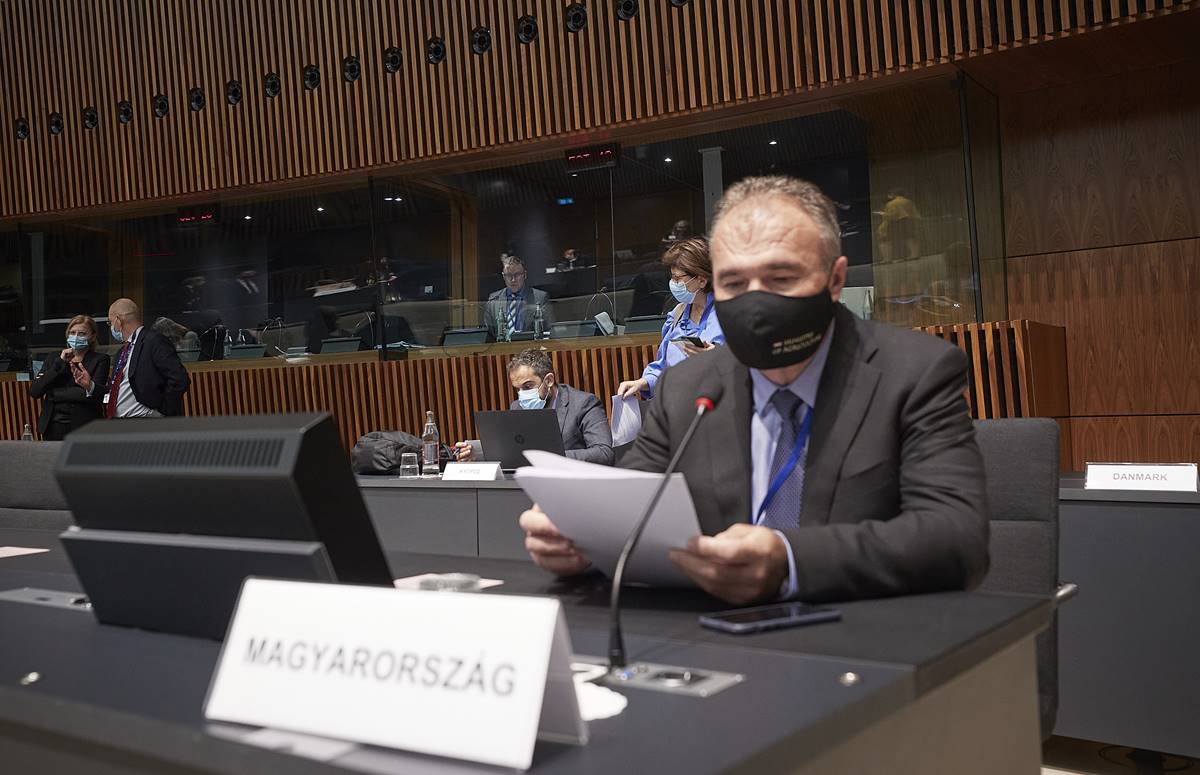
Agricultural ministers adopted council conclusions on the Farm to Fork Strategy. The conclusions highlight that the strategy should contribute to achieving the EU’s climate neutrality and biodiversity goals. Hungary agrees that agriculture should contribute to the climate and environment goals, but some targets set out in the Strategy places disproportionate burden on Member States. Especially the further decreasing of the use of chemical pesticides by 50%, and the 25% goal of organic farming areas seems to be overly ambitious. Attention should be kept on differing situation of Member States and on the efforts already made. It would not be fair to request the same decrease from those Member States who already achieved success in reducing the use of pesticides and fertilizers. Hungary annexed a statement to the council conclusions, in which they reiterated that the CAP’s contribution to the goals of the Strategy should only be linked to such criteria, which based on sound legal basis. Farmers could only be complied with such conditions, which are laid down in basic acts. On this basis, the European Commission should only examine the conditions set out in the adopted union acts when assessing the Member States' CAP strategic plans.
Prime Minister Orbán: This debate is not about money
After his one-day visit to Hungary, Polish Prime Minister Mateus Morawiecki and Prime Minister Viktor Orbán addressed a joint press conference on the Hungarian-Polish veto on the Multiannual Financial Framework of the European Union and the Next Generation recovery fund. The two heads of government also signed a common statement on their position.
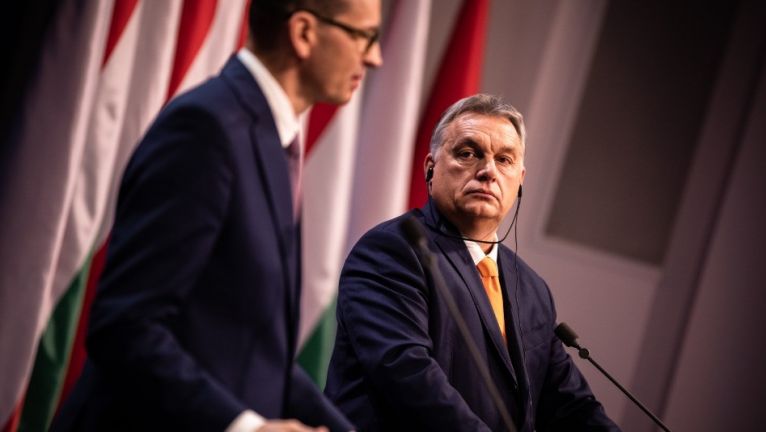
“Whether in good times or bad, it’s always good to meet the Poles,” PM Viktor Orbán began his remarks, adding that besides discussing topics such as the independence and sovereignty of our homelands, the most important question on the agenda was the “great debate, which is taking place between the European Parliament, the Commission, [other member states] governments and us.”
The Hungarian prime minister recalled that the EU summit in July witnessed one of the longest and sharpest debates in EU history, where member states were not able to close the debate, but we gave an opportunity to the Germany presidency to produce some cohesion among the member states on the topics of migration, the EU budget, and rule of law; but it did not happen.
“The proposal remains on the table, which would tie crisis funds to rule of law criteria, and this is not legal, but political in nature; and this proposal, from Hungary’s position, is not acceptable,” PM Orbán said adding that “the Hungarian and Polish governments were able to put together a joint statement of which I would like to share the final sentence: We will unify our principles and our interests on this question; Hungary will not accept a proposal that is not acceptable to Poland.”
Viktor Orbán also emphasized that the veto was not some unappropriated action from the two countries, but a legal tool provided by the Treaties. “In a case where a member state feels that its essential interests are being harmed in a particular question, it allows for the use of the veto,” he said. The PM added, “My responsibility as a patriot also obliges me, that if I see that a decision is against the interests of Hungary, I must do that [exercise the veto].”
The prime minister also drew attention to the fact that this debate is not a matter of money, it is not a financial issue. “This debate cannot be sorted out with money,” he said adding that “Hungary faces no financial loss if the European crisis management budget does not come together. This is a concern for member states where their public indebtedness is above 100 percent.”
PM Orbán closed his remarks by recalling, “Legislation on the rule of law is not necessary for crisis management […] Our votes for the budget are indispensable and unavoidable.”
Source: About Hungary
PM Orbán: Common sense prevailed at EU summit
After a deal was struck on the EU budget and recovery fund at the European Union summit in Brussels on Thursday evening, Prime Minister Viktor Orbán said in a video on Facebook that “common sense has prevailed, we’ve protected Hungarians’ money.”
According to MTI, PM Orbán said there had been a last round of negotiations with the Hungarian delegation. “We ran the last lap. Everyone played their last card,” he said, adding that an agreement was struck. “I must say, common sense has prevailed.”
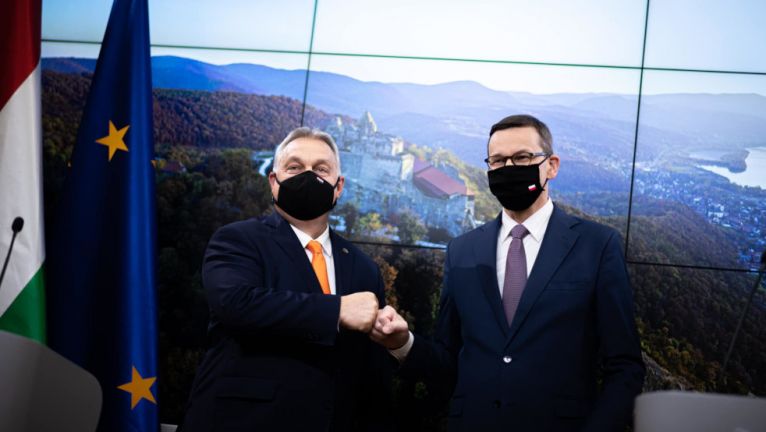
“We won because in hard times, during the epidemic and the economic crisis, there’s no time for ideological or political debates that hold us back from taking action,” he said. The prime minister said that in the end, European unity had been preserved.
PM Orbán added, however, that proposals were still on the table that many member states like Hungary would dislike, referring to migration and anti-family measures “planned by Brussels”. He said there would be disputes ahead, “but today we’ve definitely achieved three things.” Orbán said Hungary had succeeded in preventing the European basic treaty from being bypassed and from forcing on Hungarians “decisions that we don’t accept”.
Charles Michel, President of the European Council, announced on Twitter that an agreement has been reached on the EU’s multiannual budget and recovery fund at the summit.
Photo credit: Facebook
Agricultural ministers discussed strengthening of food labelling
Improving the health conscious choices and the welfare of animals were both on the agenda at the Agriculture and Fisheries Council of 15 December 2020, in Brussels. Ministers have exchanged views on a harmonized front-of-pack nutrition labelling, nutrient profiles, origin labelling and animal welfare labelling.
Union provisions on food information to consumers set out the mandatory items to be presented on the packaging of food products. The Farm to fork Strategy published by the Commission in spring 2020 pledges to strengthen these provisions in order to empower consumers’ informed, healthier and sustainable choices. Hungary highlighted that a future harmonized front-of-pack nutrition labelling system can contribute to reach these goals if it takes into account the role of single food items in a whole, balanced diet. We have to pay special attention to protect traditional food products and diets. Ministers supported the setting up of nutrient profiles, in order to combat misleading marketing practices. As regards origin labelling, the Council urged the Commission to present a proposal for stricter requirements for origin labelling of honey blends.
Furthermore, Agriculture Ministers approved a common approach for a future implementation of an EU-wide animal welfare label. Such system could provide consumers with more detailed information on the living conditions of animals. The introduction of such a label, and the provisional higher consumer price could encourage producers to implement further actions. Hungary emphasized that besides the voluntary nature of the future system, maintaining the producers’ competitiveness and improving public awareness also need attention.
Environment ministers discussed higher climate ambition in the EU and strategic actions of the EU’s Chemicals Strategy for Sustainability
The Environment Council’s meeting took place on 17 December, 2020 in Brussels, where discussions focused on climate policy and strategic steps on sustainable chemicals policy.
Based on the decision taken by the heads of state and government last week, environment ministers approved a legislation, the so-called climate law that sets rules for the European Union to achieve the collective union goal, 55% emission reduction by 2030 and climate neutrality by 2050 (so reaching net-zero greenhouse gases emissions reduction). Agreement between Council and European Parliament on the final text of the climate law can be expected during the incoming Portuguese presidency.
Environment ministers approved also a document, in which the European Union will notify - in accordance with international climate policy rules - the UN about its higher 2030 emission reduction target. The German presidency will submit this document (so-called Nationally Determined Contribution) to the UN secretariat before the end of this year.
The Environment Council approved the amendment of the Aarhus regulation on access to information, public participation in decision-making and access to justice in environmental matters to Community institutions, in order to ensure full compliance with the requirements of international law, and facilitate access to justice for stakeholders.
Environment Ministers discussed the new Chemicals Strategy for Sustainability published by the European Commission in October 2020. The goal of the Strategy is to protect environment and human health, for which the Commission envisaged several actions. Member States find these actions and political direction of the Strategy appropriate for achieving the goal of the Strategy. Ministers supported phasing out harmful substances from consumer products, emphasizing at the same time that in order to meet the goals, we need to support innovation, research and development as well as industry, particularly SMEs.
The decision of the ministers on circular economy provides a future-oriented agenda for achieving a sustainable economic system, and safeguards that the valuable resources will be reserved, and recycled in Europe. The Member States discussed how digitalisation can be beneficial for environment and for fight against climate change.
PM Orbán: To answer our calling – on the V4’s thirtieth birthday
Throughout its history, Central Europe has always had not only a role, but also a calling. Up until 1990, the Soviet occupation of our region hid this fact from our view. The task of realising our traditional mission in a modern context remained meaningless for as long as Soviet troops were stationed in our countries, and we were driven solely by the desire to break free from the Warsaw Pact.
In addition to this, our horizons were restricted and our strength diverted by the task of freeing ourselves of our own communists and – after the bayonets of the occupiers had disappeared – consigning them to where they belonged: as far as possible from governmental power, to schoolbook compendiums of historical crimes with which we can educate our children and grandchildren, and show them what comes from trying to build a future without the embrace of national ideals and Christian teachings.
After the overthrow of communism and gaining our freedom, our countries were happy, but severely weakened. All our energies were devoted to survival, the trial of strength presented by an enormous transformation, and laying the foundations for a new era compatible with the Western world. Even so, already back in 1991 the command we received from our hearts was that our countries – Poland, Hungary and Czechoslovakia – would have to join forces in some way. We knew that centuries come and go, but the peoples of Central Europe remain a community of shared destiny.
And indeed, thirty years later and members of NATO, we are able to call ourselves the most dynamic region in the European Union. Solid growth, low unemployment, rapid digital transformation, strong investment: all this is what we are today.
Central Europe
The difficult debates within the European Union on migration, the demographic situation, the role of families, the conflict between national culture and multiculturalism are once again drawing our attention to Central Europe’s historic calling. Is there even such a thing? If so, what is its modern form? And for us prime ministers the most pressing question is this: can politics act in response to it?
According to the Hungarian way of thinking, Central Europe is the territory that lies between the lands of the Germans and the Russians. It is bordered on the north by the Baltic Sea, and on the south by the Adriatic. And while one might debate its precise boundaries, there is no doubt that Central Europe’s core region is formed by the V4 countries.
We Hungarians have always believed that we were not simply born into this world: if one was born a Hungarian, one also has a mission. One’s mission points beyond oneself: its scope and significance are European. We also know that we can only fulfil this mission together with the other peoples of Central Europe. For in the region between the worlds of the Germans and the Russians – the region in which Western Christianity borders the Orthodox world, and where many languages and national cultures have grown to maturity – there is a specific common cultural quality, an outlook on life, a turn of mind, and a characteristic attitude. A multitude of Polish, Slovak, Czech and Hungarian poems, novels and films are testament to this. And our calling is to maintain all this.
Hungarians’ conception of their mission dates back to the Roman Empire. To our minds, our Europe was created by peoples who, independently of one another and at different times, attacked the Roman Empire. These peoples founded their countries on the ruins of the former Roman Empire. They adopted Christianity, but did not surrender their own cultures; as a result, a variety of alloys were forged by the hammer of history.
This decided our destiny, with the birth not only of national states, but also of national cultures. There emerged an ideal, a law, a precept of how Europe should be: a great spiritual unity with shared cultural outlines, notions and ultimate goals, but with separate and independent members bound to one another in the unity of Europe. Every one of these is duty-bound to serve European spiritual unity and its goals, but they are not obliged to serve one another’s interests. Europe is a diverse unity. Those who attack its unity are bad Europeans; but so are those who seek to erase its diversity.
The unity of multitude and multitude in unity. This is Europe’s secret, its allure; it is this dramatic tension that gives it beauty, and it is this innermost essence that is found nowhere else in the world. This is why the people of Central Europe are in love with Europe. They understand that harmony lies in the tension and consonance of difference. Harmony does not mean uniformity; it does not mean monotonous homogeneity. This is the source of the mission of Hungarians and the other Central European nations striving for independence.
Facing outward, defending the spirit which binds nations together and Christian European culture against all external attacks on Europe, in the form of a bastion and a shield; facing inward, defending diversity against attempts at imposing hegemony over independent nations. For centuries this has been the secret and precondition of European balance and stability. This is European self-defence; and, in seeking to introduce the idea of European sovereignty in Brussels, the French president also seems to be cautiously moving in this direction. A dual struggle of defence against external and internal enemies: a struggle for Europe’s unity, and for its diversity. Successive renewed attacks externally, and the flames of imperialist ambition rising internally. This was Europe’s political history until the end of World War II, when our continent lost the right and the ability to control its own destiny.
The V4 and Europe
In the mid-2000s all four of us joined the European Union. New horizons have opened up, and debates about Europe’s nature and its future have also became our debates. After being outsiders we became insiders, and we were faced with an unavoidable question: what will be Central Europe’s contribution to our shared European future? The old members of the club heard concepts that were strange to their ears: homeland, Christianity, family and sovereignty. Initially they tended to regard these as elements of cultural and historical folklore. I think they believed that this was some kind of temporary condition affecting late arrivals, something which would pass with time, like chicken pox. “After all”, they thought, “at the end of the day, we’re all heading in the same direction, and surely we all want to arrive at the same destination.” This was a pleasing thought, which took no one outside their comfort zone – and indeed the 2008-2009 financial crisis presented enough technical challenges as it was.
Then the migrant crisis crashed in on us. Eyes were opened, everything was thrown into sharp relief, and we clearly saw profound differences between ways of thinking, philosophies, principles of social organisation and personal commitments.
It was then that we Hungarians realised that the speeches and writings about a post-Christian and post-national era were not merely journalistic bombast, but real political intentions; in fact, they formed a complete European programme, the future envisaged by Westerners, a future which they had already started building.
We realised that while we had been enduring communism in Europe’s Sovietised territories and longing for a way of life based on Christianity and sovereignty, those living in Europe’s Americanised half had been redefining the essence of Europe, and had been steadily working on the implementation of their programme. They did not see Europe’s mission as repelling external attacks against Christianity, or as preserving our internal diversity. Their new European mission had become complete openness: the elimination of borders – or at most their existence as only a temporary, necessary evil; gender roles and family models that can be changed at will; and policy that sees the obligation to maintain our cultural heritage as a task that should rather be left to museologists. And their goal is not only to conceive, create, introduce and legally mandate all this in their own countries, but also to make this the general condition in every country of the European Union – including those like ours, which are unwilling to acquiesce.
Mission
In this situation in Europe, we Hungarians can clearly see the essence of our European calling.
It is to bring the uncompromising anti-communist tradition into the common store of European values. It is to place the crimes and lessons of international socialism alongside the crimes and lessons of national socialism. It is to show the beauty and competitiveness of a political and social order that stands on Christian social teachings. It is to show others – first and foremost our friends in France – that, despite weaknesses and failings in personal faith, in Central Europe there is a Christian model for the organisation of society which is based on Christian teachings. It is to continuously alert those nations in Europe’s safe interior to the existence of external dangers. It is to remind them of something that we know so well from history: that the waves of people crossing the Mediterranean are now pushing the tide towards us, and these waves could reach all the way to Scandinavia. The masses of migrants now appearing are, in fact, part of the waves of those longing for European life, against whom our ancestors always sought to defend themselves with all their might. Not to defend oneself is de facto surrender, and its consequence will be complete civilisational transformation – as experienced at close quarters by nations in the Balkan neighbourhood on Europe’s southern and eastern perimeter.
And it is to remind ourselves that no matter how enlightened the builders of this empire may be, they will ruin the spirit of Europe, and will therefore always achieve the opposite of the original intention.
On these difficult and complex issues there may well be differences among us – including among the Visegrád countries. There are certainly differences in emphasis in terms of our approaches to history, there may be differences in the way we feel about one country or another, and at times we may even disagree on the interpretation of geopolitical relations.
But it is certain that our nations fully appreciate the responsibility they bear for the future of Europe: to defend it against external attacks and to defend it from internal imperial designs, maintaining the sovereignty of our homelands and nations.
Failing in one’s mission may be heroic, but there is no joy in it. Fulfilling a mission, while guiding one’s country to success, freedom and prosperity is no less heroic; and it is also a source of joy. Central Europe’s prospects for the latter outcome are good. On behalf of my nation, I thank you for these three decades of Visegrád cooperation.
The ministers responsible for employment and social matters discussed current matters and Commission initiatives in a videoconference on 15 March 2021
The Employment, Social Policy, Health and Consumer Affairs (EPSCO) Council held an informal virtual meeting on 15th of March 2021. The Hungarian delegation was represented by Mr Attila Fülöp, Minister of State for Social Affairs.
The first political debate was centered around the employment and social policies in the context of the Recovery and Resilience Plans (RRP). Most of the ministers agreed that following the crisis management, both the Union and the Member States should enter into a recovery phase. Furthermore, the ministers agreed that besides the significant challenges, the crisis creates opportunities for a recovery with quality jobs, created primarily in the digital and green sectors.
The Ministers held a policy debate on the action plan on the European Pillar of Social Rights. The action plan proposes headline targets for 2030 in the field of employment, training and combating poverty, and sets out ongoing and planned initiatives, aiming at the implementation of the principles of the Social Pillar. The debate was also a preparation for the Social Summit to be held in Porto on 7-8 May 2021, where the action plan will be at the centre of the discussions.
Regarding the area of gender equality, ministers were invited to held a policy debate on this topic. The policy debate focused on ways to strengthen equality, non-discrimination and diversity as policy priorities at a European level. In particular, ministers shared what legislative and non-legislative measures they believe necessary, in order to make further progress in these important areas.
At the meeting, both the Commission and the Presidency informed the Ministers on some of the current initiatives being on the EU agenda. The Commission presented the Green Paper on Ageing; its strategy on the rights of persons with disabilities for the period of 2021-2030; the EU anti-racism action plan 2020-2025; as well as its proposal on pay transparency measures.
Hungary supports Europe's Beating Cancer Plan
A videoconference of EU health ministers took place on 16 March 2021, during which ministers exchanged views on the Europe’s Beating Cancer Plan, published by the European Commission on 3 February.
In her contribution, Ildikó Horváth, Secretary of State for Health, emphasized that prevention has a key role to play in the sustainability of the cancer plan. Therefore, Hungary would support an ambitious programme to make Europe tobacco- and nicotine-free. The Secretary of State asked the Commission to consider the introduction of a Europe-wide plan on packaging and restrictions on the use of flavouring as well as limitations on nicotine content also in case of new generation products. The European Cancer Plan should take into account the different starting points of Member States, by agreeing in advance on a common methodology for data collection.
The Secretary of State also stressed that the Hungarian government is committed to the fight against cancer and especially to early diagnosis. She pointed out that Hungary has been operating a National Cancer Control Programme since 1993, and in 2018 we established the Central European Academy of Oncology to initiate international cooperation between Central and Eastern European countries. We consider it an important result, that the HPV vaccination of the respective target group is 82%.
She also called attention to ensure equal participation of researchers from Central and Eastern Europe in research.
Finally, the Secretary of State emphasized that we support initiatives at EU level in this area, as Europe can only succeed together.
At the meeting, the ministers took an overview of the actual pandemic situation and agreed on the necessity of maintaining public health measures, until sufficient population immunity is achieved.
Environment ministers discussed the new EU strategy on adaptation to climate change
Environment ministers held exchange of views on the new EU strategy on adaptation to climate change during their informal videoconference on 18 March.
Ministers agreed with the three main objectives of the strategy, by emphasizing that adaptation to the unavoidable negative impacts of climate change (such as drought, heatwaves, floods) should be smarter, swifter and more systematic. Achieving these objectives would help Member States build a climate-resilient economy and society. Ministers stressed the importance of the availability of data on climate-related risk and losses, risk assessment and engaging the private- and insurance sector. The strategy also aims at stepping up international action, helping third countries on adaptation to climate change. In this context, ministers also highlighted the importance of international finance. The Presidency informed ministers about the state of play on the political negotiations between the Council and European Parliament on the European climate law. This new legislation will set the higher CO2 emissions reduction target for 2030 and the climate neutrality goal for 2050.
Environment Ministers exchanged their views on the appropriate deployment of the European resources in the framework of the European Semester to address the unprecedented health, economic and social consequence of the Covid-19 pandemic, and to contribute to the Green Transition. Environment Ministers also set the course for the further discussions on the draft of the Battery Regulation with a view to promote “electromobility”, to contribute to the achievement of climate targets and to boost the transition to a more circular economy where the waste can replace raw materials.
The Presidency informed ministers about the approval of the council conclusions on Sustainable Chemicals Strategy of the Union. These conclusions demonstrate strong political commitment from the EU, towards sustainable transformation of the life cycle of chemicals, on a Union and international level as well. Conclusions also point out, that the best way forward would be starting the implementation of the Strategy adopted by the Commission in October 2020. Ministers were also briefed about the state of play on the 8th environment action programme. The Council has adopted a mandate and ready to start negotiations with the European Parliament on this matter.
Informal video conference of European affairs ministers, 23 March 2021
Ministers examined a statement for the video conference of the members of the European Council on 25 and 26 March. The EU leaders will discuss the response to the COVID-19 pandemic, the Single Market, industrial policy, digital transformation and the economy, the situation in the Eastern Mediterranean, and relations with Russia.
- COVID-19: The leaders will take stock of the roll-out of vaccines and the epidemiological situation and pursue the coordinated response to the pandemic crisis.
- Single market, industrial policy, digital transformation and the economy: They will discuss the key priorities for the single market, industrial policy and the digital transformation. The leaders will look at the Digital Compass, including targets set for 2030, and review work on digital taxation. They will address the priorities for the 2021 European Semester and leaders will be invited to endorse the recommendation on the economic policy of the Eurozone in their next formal meeting.
- Eastern Mediterranean: The EU leaders will discuss the situation in the Eastern Mediterranean. The High Representative and the Commission are expected to submit a report on EU-Turkey relations ahead of the meeting, following the conclusions of the European Council in December 2020.
- Russia: The EU leaders will discuss relations with Russia.
- The key of our collective action to tackle the pandemic is to accelerate the production, delivery and deployment of vaccines. No effort will be spared.
European Council
CAP reform negotiations enter the final stage
At the Agriculture and Fisheries Council in Brussels on 22 and 23 March, EU agriculture ministers held intensive discussions on the reform of the Common Agricultural Policy. The preparation of the new Common Agricultural Policy, starting in 2023, has reached a crucial stage. The Hungarian government will continue to do its utmost, to provide a stable framework for the Hungarian agriculture and for the Hungarian farmers.
The European Commission proposed a legal framework for the new EU Common Agricultural Policy in June 2018. After two and a half years of negotiations, the Council and the European Parliament adopted their respective positions in October 2020. On this basis, trilogues have begun between the EU institutions.
Hungary has main three expectations of the new Common Agricultural Policy: a sufficiently ambitious budget, appropriate policy instruments and practicable, user-friendly rules. The first objective has been met, as the recently adopted seven-year EU financial framework provides an adequate amount of resources for the agricultural sector. Now we are concentrating all our efforts on the availability of policy instruments that ensure the competitiveness of Hungarian farmers, in a way in which they can also contribute to the preservation of the values of our created world - the Hungarian Minister, István Nagy added.
It is just as important to be able to develop the Hungarian CAP strategic plan along simple rules, which can be also implemented in practice. During the planning, it is essential to be able to determine our priorities related to the new Common Agricultural Policy, on the basis of our national specificities, explained the Minister.
Portugal, which holds the Presidency of the Council, has the explicit aim of reaching a political agreement with the European Parliament by the end of May, on all three regulations for the CAP reform.
The Hungarian government strongly supports the aspirations of the Portuguese presidency, as it is time to put an end to the negotiations, which have been going on for three years. Even in the final stages of the negotiations, we are firmly committed to the protection of sustainable Hungarian agriculture, which means a secure livelihood for farmers - concluded the head of the Ministry of Agriculture.
Informal videoconference of the Ministers for European Affairs, 20 April 2021.
At the informal videoconference meeting of the Ministers for European Affairs on 20 April 2021, Hungary was represented by Minister Judit Varga. The Council was chaired by Ana Paula Zacarias, Portuguese Secretary of State for EU Affairs, and the Commission was represented by Vice-Presidents Maroš Šefčovič and Dubravka Šuica, and by Commissioners Olivér Várhelyi and Didier Reynders.
EU-UK Relations
During the the informal videoconference of the Ministers for European Affairs on the 20th of April, the ministers discussed the state of play of EU- UK relations. In order to preserve the results of the peace process in Northern Ireland as well as the integrity of the EU’s internal market the Member States supported the Commission’s efforts to find solutions, jointly with the UK, to the problems identified in the implementation of the Northern Ireland Protocol of the Withdrawal Agreement. They voiced their support for the two parties to draw up of a workplan setting out deadlines for the implementation steps. Member States also discussed the ratification process of the EU-UK Trade and Cooperation Agreement that has been provisionally applied since 1 January 2021, and expressed their hope that in the last week of April the European Parliament will put on its agenda the vote on their consent needed for the conclusion of the agreement. This is necessary for the agreement to enter into force on 1 May 2021.
Conference on the Future of Europe
During the meeting of the informal videoconference of the Ministers for European Affairs, ministers were informed by the Presidency about the state of play regarding the Conference on the Future of Europe, following the first two meetings of the Conference's Executive Board. The Conference on the Future of Europe is aimed at involving citizens in a wide-ranging debate on Europe’s future.
The Executive Board of the Conference on the Future of Europe launched the multilingual digital platform for the Conference on the Future of Europe on 19 April 2021, inviting all EU citizens to contribute to shaping their own future and that of Europe as a whole. (https://futureu.europa.eu/?locale=en)
The Presidency also informed the ministers that the opening event, scheduled for 9 May 2021, would take place in Strasbourg in a hybrid format, open to citizens in digital and interactive form. The opening event will also be televised and online.
By spring 2022, the Conference is expected to reach conclusions and provide guidance on the future of Europe.
Annual Rule of Law Dialogue country-specific discussion
During the informal videoconference of the Ministers of European Affairs, ministers held a country-specific debate on five Member States: Germany, Ireland, Greece, Spain and France in the framework of the annual rule of law dialogue.
COVID-19 EU coordination
The Commission and the Presidency briefed the ministers on the state of play on EU coordination regarding the Covid-19 epidemic, followed by an exchange of views on the most pressing issues concerning the epidemic, such as the current situation on vaccines, the ongoing work on digital green certificates, the overall epidemiological situation and travel restrictions.
Enlargement and Stabilisation and Association Process
The Presidency gave a state of play about the Enlargement and the Stabilisation and Association process and its priorities for the coming months, namely to finalise the negotiations on the IPA III (Instrument for Pre-accession Assistance) Regulation, to organize Intergovernmental conferences with Montenegro and Serbia under the revised enlargement methodology, and to organise the first Intergovernmental conferences with North-Macedonia and Albania.
Working visit of Viktor Orbán, Prime Minister of Hungary – 23 April 2021
Prime Minister Viktor Orbán arrived in Brussels today for a working visit and he held talks with Ursula von der Leyen, President of the European Commission. The talks focused on the finalization of the Hungarian Recovery and Resilience Plan, and they discussed current EU affairs.
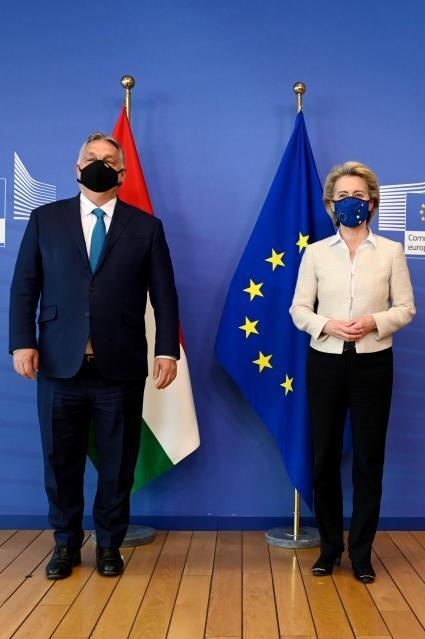
Photo: European Commission

